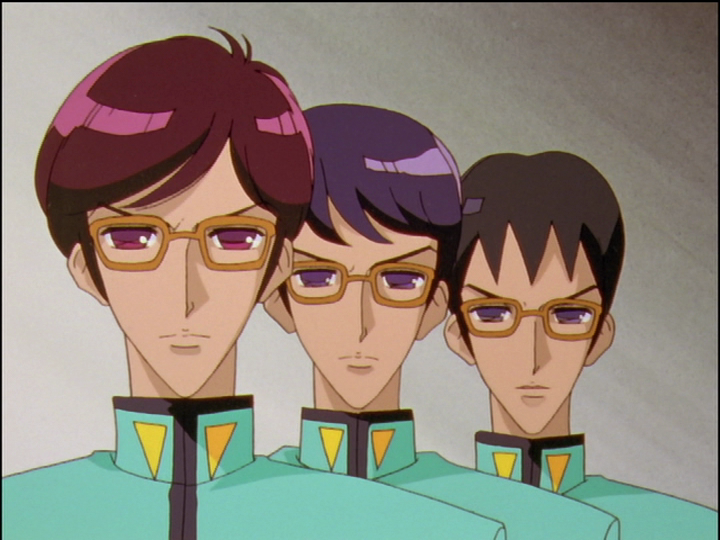
Nanami. <- Previous • Next -> Ruka.
This is an easy one. The musical nerd boys make little progress over the series; their arc is nearly a straight line.
I call them nerd boys because of their glasses, but they are in fact ordinary boys. Their names are among the most common and undistinguished in Japan, and the boys are so undistinguished—and indistinguishable—that they are not given personal names, only the family names. They can be told apart by their hair, eyes, and musically tuned voices—they are not identical, but they try to be and nearly succeed. The system of control has pressed them into conformity. Nanami’s minions are different: They are individuals and are never quite in sync, even when they first decide to become Nanami’s minions.
The beneficiaries of the patriarchy have cause to conform to gain the benefits. The victims of the patriarchy have cause to resist and refuse conformity. Utena is an unusual case. The character designs of the nerd boys say that their personalities are different. Their behavior is nearly identical because they conform to their role.
The boys are equated with elephants, implicitly in episode 8 and explicitly in episode 24. Elephants in Utena (at least these elephants) stand for predatory male pursuit of women. The boys stalk Nanami in episode 8 in the same way that the elephants stalk Nanami and her minions when they travel to India. (I think it’s no coincidence that predatory Akio originates from India, or at least from South Asia.) Even when not pursuing Nanami, as in Nanami’s Egg episode 27, they are associated with Nanami.
Whether it’s supposed to or not, it comes off as a stereotype of Indians. India is huge and diverse and can do without stereotypes. Nevertheless, Indian culture by and large is claimed to be more patriarchal than Japanese culture, which is by and large more patriarchal than American or European culture—which are plenty patriarchal already.
So the claim is that ordinary boys are stalkers. Patriarchal culture requires them to be. They are not as bad as special boys like Saionji and Touga. They fail in every way: Their love letters are ignored (not important enough to be ridiculed like Wakaba’s), their violence is overcome (Saionji at least doesn’t get beaten up himself), their attempt to silence Utena is defeated in moments.
The boys pursue Nanami fruitlessly in most of their appearances. In episode 6, Mitsuru beats them up. In episode 16, they try to silence Utena for telling Nanami that the cowbell is weird, and Utena knocks them down. They call out to Wakaba in episode 20. In episode 24 they are equated with the elephants that pursued Nanami in India. In the epilog, they have given up on Nanami and pursue her minions instead. It does count as progress: Nanami is special and considers herself above their level, and her minions are ordinary girls and should be on the same level as the nerd boys. But their pursuit remains fruitless. There’s a little more discussion at epilog - the good make progress.
Jay Scott <jay@satirist.org>
first posted 19 July 2023
updated 24 April 2025